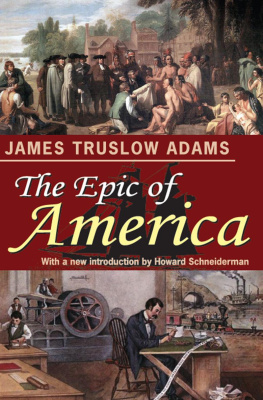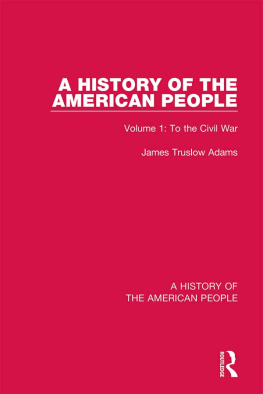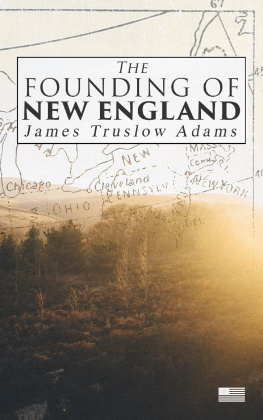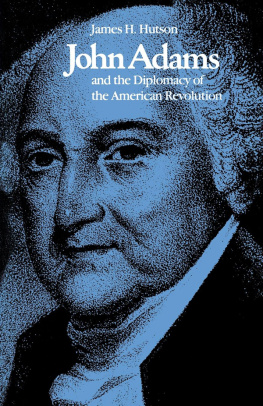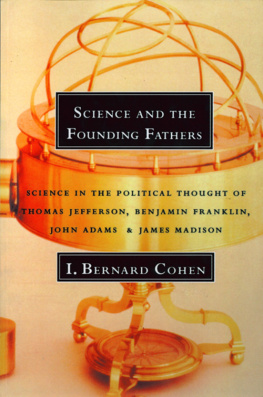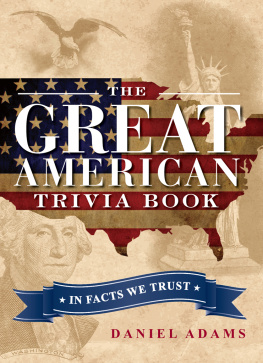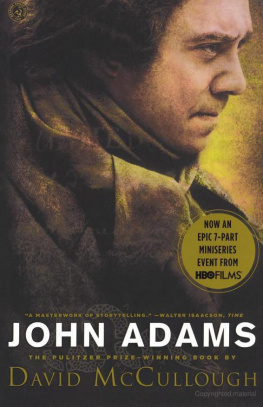Originally published in 1931 by Little, Brown, and Company.
Published 2012 by Transaction Publishers
Published 2017 by Routledge
2 Park Square, Milton Park, Abingdon, Oxon OX14 4RN
711 Third Avenue, New York, NY 10017, USA
Routledge is an imprint of the Taylor & Francis Group, an informa business
Copyright 1931 by James Truslow Adams.
All rights reserved. No part of this book may be reprinted or reproduced or utilised in any form or by any electronic, mechanical, or other means, now known or hereafter invented, including photocopying and recording, or in any information storage or retrieval system, without permission in writing from the publishers.
Notice:
Product or corporate names may be trademarks or registered trademarks, and are used only for identification and explanation without intent to infringe.
Library of Congress Catalog Number: 2011034567
Library of Congress Cataloging-in-Publication Data
Adams, James Truslow, 1878-1949.
The epic of America / James Truslow Adams.
p. cm.
Originally published in 1931 by Little, Brown, and Company.
Includes a new introduction by Howard Schneiderman.
ISBN 978-1-4128-4743-8 (acid-free paper)
1. United States--History. I. Title.
E178.A25 2011
973--dc23
2011034567
ISBN 13: 978-1-4128-4743-8 (pbk)
SAIL sail thy best, ship of Democracy!
Of value is thy freight t is not the Present only,
The Past is also stored in thee!
Thou holdest not the venture of thyself alone not of the western continent alone;
Earths rsum entire floats on thy keel, O ship is steadied by thy spars;
With thee Time voyages in trust, the antecedent nations sink or swim with thee,
With all their ancient struggles, martyrs, heroes, epics, wars, thou bearest the other continents;
Theirs, theirs as much as thine, the destination-port triumphant;
Steer then with good strong hand and wary eye, O helmsman thou carriest great companions,
Venerable, priestly Asia sails this day with thee,
And royal feudal Europe sails with thee.
How can I pierce the impenetrable blank of the future?
I feel thy ominous greatness, evil as well as good;
I watch thee, advancing, absorbing the present, transcending the past;
I see thy light lighting and thy shadow shadowing, as if the entire globe;
But I do not undertake to define thee hardly to comprehend thee.
WALT WHITMAN
JAMES TRUSLOW ADAMS AND THE AMERICAN DREAM
Howard Schneiderman
THE organizing principle of The Epic of America can be summed up in one felicitously turned phraseAmerican dream. First published in 1931, and reissued here, The Epic of America was the best-selling non-fiction work right through 1932 and its popularity helped the phrase American dream, coined by its author, James Truslow Adams, take on a life of its own.
The American dream is so widely used that it has become a powerful metaphor of core American values. While economic success is first among these values, others, as Adams knew, are almost equally important. Among these values is being able to grow to fullest development as men and women, unhampered by the barriers which had slowly been erected in older civilizations, unrepressed by social orders which had been erected for the benefit of classes rather than for the simple human being of any and every class. The American dream mandates that all these values can be accomplished through hard work and individual effort. Indeed, Adams sought to have his publisher call this book The American Dream, instead of The Epic of America.1 Despite his failure to name the book as he pleased, the notoriety and far-ranging citations to Adams Epic have been largely due to the American dream metaphor.2
Counterintuitively, perhaps, the timing of the publication of Adams book could not have been better. In 1931, America was still in the early stages of the Great Depression. Wall Street had melted down, personal savings and investments had been vaporized, businesses were going bust, and unemployment was rampant. America was in the midst of its worst economic disaster when The Epic of America was published. But Adams Epic was more than just a history of America, beginning before Europeans began exploring and colonizing it and ending in the then contemporary early 1930s. In its way, The Epic of America was something of an historical time capsule, filled with hope, national pride, and reminders that what Adams called the American dream was still alive and worth aspiring to, despite the nightmare Americans were living through. The book was an instant success.
Not only did The Epic of America top the best-seller lists, but it also was a leading title in the relatively new Book-of-the-Month-Club, assuring it an even more broadly based readership. Spreading from and beyond The Epic of America, Adams famous metaphorical phrase took off like a rocket, and it was soon being used in academic articles, as well as in popular magazines such as the Saturday Review of Literature. From the start, sociologists began using the American dream metaphor, and sociological literature has been rife with it since the 1930s.3 Some of this literature was highly focused on the normative aspects of the dream, as in Leo Rostens 1939 study of Hollywood, published in Public Opinion Quarterly, in which he showed how the American dream had formed the backbone of modern American movies. More famously, Robert Merton discussed the American dream in terms of Americans unfulfilled aspirations for success in a revision of his 1938 sociology of knowledge article, Social Structure and Anomie.4
Indeed, two of the most important American community studies ever undertakenRobert and Helen Lynds Middletown in Transition, and W. Lloyd Warners Yankee City seriesmade extensive use of the American dream as a tool for understanding values held in these communities. While Robert Lynds solo study of Muncie, Indiana, Middletown, was published in 1929, two years before The Epic of America, and therefore could not have referenced the American dream metaphor, the second study, Middletown in Transition, published in 1937, did. The Lynds not only integrated the dream into the analysis from beginning to end, but also showed through quotations from those interviewed that the metaphor had speedily become part of their everyday way of thinking.5
Furthermore, the generational differences in the class and status structure of Muncie between the first and second studies highlighted the importance of the American dream to understanding stratification in America. In the first study, Middletown was dominated by successful businessmen who formed a functional elite running the economic and political structures of the city. When they returned to Middletown, the Lynds found that some of the families of the successful businessmen had formed an upper class in the citys status hierarchy. In a few generations these families rose from comparative poverty to great wealth, [and] they fit perfectly the American success dream.6
Unlike the Lynds, who were concerned with the objective economic aspects of class in Muncie, W. Lloyd Warners

